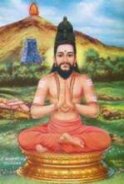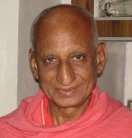

THE ESOTERIC
KANDAR ANUBHUTI
OR
THE SECRET TEACHING ON
GOD-EXPERIENCE
(A Treatise on Adwaitic Realization)
OF
SAINT ARUNAGIRINATHAR

 |  THE ESOTERIC KANDAR ANUBHUTI OR THE SECRET TEACHING ON GOD-EXPERIENCE (A Treatise on Adwaitic Realization) OF SAINT ARUNAGIRINATHAR |  |
 | by N.V. Karthikeyan |  |
| verses contents 10 11 12 13 14 15 16 17 18 19 .. 25 this verse in PDF version (4 parts) p-1 p-2 p-3 p-4 complete download of this book |
VERSE-15 முருகன் குமரன் குகன் என்று மொழிந்து உருகும் செயல்தந்து உணர்வு என்று அருள்வாய் பொருபுங்கவரும் புவியும் பரவும் குருபுங்கவ எண்குண பஞ்சரனே.Murugan kumaran guhan enru mozhinthu Urukum seyalthanthu unarvu enru arulvaai Poru pungavarum puviyum paravum, Guru pungava enguna panjarane. 'Murugan, Kumaran, Guhan' - Thus, to utter and melt Commentary After giving the seeker a glimpse of Samadhi, the Guru instructed him to save himself by obtaining the Lord's Feet and thus give up desires (verse-14). Fired up with that instruction, the seeker girds up his loins and plunged into intense Sadhana of chanting and singing the Lord's Names (Japa and Kirtan), which helped him to weaken the desires and the out-going tendency of the mind. But he knows that mere chanting (மொழிதல்), without the mind and heart going with it, will not yield much results (verse-5). He also knows that his effort alone is not enough; it has to be augmented by Divine Grace. So he now prays to the Lord, the Supreme Guru, to confer His Grace ('arul' அருள்) on him so that when he chants 'Murugan, Kumaran, Guhan', his mind would melt ('urugi' உருகி) and the heart feel ('unarvu' உணர்வு) His Presence within. Resorting to the Lord and giving up desires are not two independent Sadhanas to be practised separately, one after the other. They are simultaneous, because the mind can think of one thing only at a time. If it thinks of God, it cannot think of objects (desires). To the extent the mind is turned towards God, to that extent it is turned away and weaned from desires. So, sincere and continued repetition of the Lord's Name gradually thins out the desires and eventually brings about their destruction. It is desires that harden one's mind and heart. Thus by a dedicated practice of Japa, when the desires are weakened and destroyed, the mind automatically melts, leading to actual feeling or realisation of God within. There seems to be some great significance in the sequence of the Names of the Lord as "Murugan -- Kumaran -- Guhan" and the "chanting -- mind-melting -- heart-feeling." 'Guhan' means the 'Lord Who dwells in the Heart' and refers to the SELF, and 'feeling' (experience) is connected with the Heart. Thus Arunagiri seems to introduce the concept of Self or Atman into the practice. We may say, from now onwards Antaranga Sadhana or real internal Sadhana starts; up to this time it was Bahiranga Sadhana or external Sadhana. The prayer is addressed to Lord Murugan who is worshipped both by the gods in heaven and the mortals on earth, alike. The Devas were driven out of the heavens and put to untold humiliation by the Asura Surapadman and his brothers, with the power of extraordinary boons obtained by them from Lord Siva. Lord Skanda killed the Asuras in battle and saved the Devas from the atrocities of those Asuras and restored them back to their rightful abode, heaven. Hence, the Devas always offer devout worship to the Lord. People on earth approach the Lord for various purposes - for fulfillment of their desires, for warding off calamities, for wealth and happiness, for devotion, for attainment of God-realization, etc. - for everything they are in need of, -- all which the Lord grants. Hence, the mortals on this earth sing the Lord's praise and resort to Him for fulfillment of all their needs. Lord Skanda imparted the secret Upadesa on Pranava (Omkara) to Lord Siva. He also gave Jnana-Upadesa to saint Agastya and the six sons of Paraasara Muni. Hence, the Lord is addressed as the Supreme Guru or Master. The Lord is the abode of the eightfold attributes which, according to the Tamil scriptures, are: 1. Self-dependence, 2. Immaculate body, 3. Natural understanding, 4. Omniscience, 5. Natural freedom from attachments, 6. Unlimited grace, 7. Omnipotence, and 8. Limitless Bliss. These attributes are reducible to Sat-Chit-Ananda, which is Brahman, the Absolute. The Lord's Names are filled with infinite powers, they are all-purifying. The Name is considered to be even more powerful than the Lord Himself; because while the Lord saved a few only, His Name has bestowed liberation on many. Every Divine Name is a condensed form of the cosmic vibration - a powerful harmonising vibration - which is capable of consuming discordant vibrations (thoughts) of objects. Repetition of the Lord's Name creates such a harmonious vibration in the system and the mind that it is easily attuned to the Lord, who may be said to be a Cosmic Vibration. The mind becomes subtler and subtler by prolonged repetition so that a time comes when the mind melts itself in God, and God alone remains. Hence the seeker prayers to the Lord to grant him the blessedness of repeating His Names as "Murugan, Kumaran, Guhan," and so repeating to melt the mind, and to experience God in his heart. Japa to be accompanied with heart's feeling is not an easy achievement, because the mind is full of impurities and it takes quite some time for the mind and heart to be purified and to melt. But the Name of the Lord is powerful enough to bring about this effect, provided that it is done with faith and for a long time. Will this alone do? No. Sadhana does not end with purification of heart. When the Lord's Name is repeated, the heart should melt and it should further lead to inner communion with the Lord. It should end in spiritual awareness - an awareness of one's true Being or God. God-consciousness or Divine Experience is the goal of all spiritual Sadhana. When we utter the Lord's Name, the mind should melt and the heart should feel God. It is the at-one-ment of the speech, mind, and heart - the total personality of ours - with God that can bring God-Experience. Else, this delusion of world-experience will not leave us and we will be in that condition which was touchingly portrayed in verse 5. But one should not lose faith. Continued practice of the constant utterance of the Lord's Name, with love and devotion to His Feet, will bring about the melting of the mind and Divine feeling in course of time. Patanjali Maharshi in one of his Sutras, says: "satu dheergakaala nairantarya satkaaraa sevitoo dhridha bhoomihi" -- "One gets established in one's practice when it is continued for a long time, without interruption and done with affection and total dedication." The utterance of the Lord's Name leads to melting of the heart (which is hardened due to countless desires) and finally to the Awareness of God. Utterance of the Name, melting of the heart and God-Experience - this is the process of Bhakti Yoga; and this can be compared to the three steps of the Vedantic Sadhana of Vaasana-kshaya, Manonaasa, and Tattva Jnana. Vaasana means subtle desire, and the mind is nothing but a bundle of Vaasanas. There is nothing to be called the mind when there are no Vaasanas, even as there is no cloth without the threads constituting it. Now, when we think of an object, a desire for it arises in the mind which is a disturbance in the mind. Just as the thought of an object is capable of creating a disturbance in the mind, which is desire; even so a thought of God is capable of setting a harmony or balance in the mind, which is destruction of desire. This destruction of desires or the process of pulling out the threads of Vaasanas from the mind is called Vaasana-kshaya, which is brought about by the utterance of the Divine Name in the path of Bhakti. Such is the difference between God-thought and object-thought. Just as there is no cloth when the threads that constitute it are pulled out one by one, there is no mind when the Vaasanas that go to make it are thus, destroyed gradually. Vaasanakshaya, therefore, leads to Mano-naasa (destruction of mind), which is the melting of mind consequent upon the utterance of the Lord's Name. When the mind is thus destroyed, the Atman, which is Self-luminous shines in its pristine splendor, even as the sun shines when the clouds that hide it are dispersed. The sun is always there and it ever shines; we do not create the sun or bring light to it; only the clouds, which are a collection of particles of water, that screen it are scattered. Similarly, when the mind, a bundle of desires, is destroyed, the Atman which ever shines in our hearts is revealed and experienced, which is Tattva Jnana. Thus, Vasanakshaya leads to Manonaasa, and Manonaasa to Tattva Jnana - repetition of the Lord's Name to melting of mind, and the latter to Experience of God. Such great Vedantic truths have been compressed in this verse in simple terms. Tattva Jnana may be said to be termed as, "Unarvu" (உணர்வு) in Tamil - Awareness, Experience, or Feeling. Repetition of the Lord's Name, melting of mind, Feeling of God -- மொழிதல், உருகுதல், உணர்தல் -- these may be said to refer to the physical, mental and heart levels, respectively, or the gross, subtle and causal conditions. Whether it is the path of Bhakti or Jnana, the stages to be passed are almost the same, only terminologies differ. Japa Sadhana is, therefore, considered as a complete Sadhana in itself, by Swami Sivanandaji Maharaj. It is capable of bringing about God-realization. Japa leads to meditation and meditation to Realization. |
| contents 10 11 12 13 14 15 16 17 18 19 .. 25 this verse in PDF version (4 parts) p-1 p-2 p-3 p-4 |
| ... www.kaumaram.com ... The website for Lord Murugan and His Devotees முகப்பு கௌமாரம் அட்டவணை மேலே தேடல் home Kaumaram contents top search |
Kaumaram.com is a non-commercial website. This website is a dedication of Love for Lord Murugan. Please take note that Kaumaram.com DOES NOT solicit any funding, DIRECTLY or INDIRECTLY. |